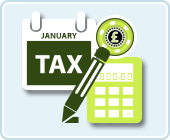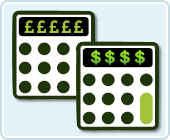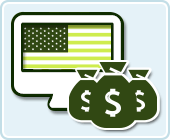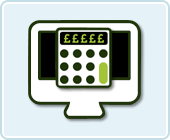UK Poker & Gambling Tax Guide 2024
 Death and taxes are two of life's certainties, the saying goes. But if you're a poker player crushing cash games in the UK, what do you have to pay?
Death and taxes are two of life's certainties, the saying goes. But if you're a poker player crushing cash games in the UK, what do you have to pay?
Will you be forfeiting all of your winnings to the HMRC? Can you claim for losses? And what happens if you go to America to play?
Hopefully, we can answer a few of the most pressing tax-related questions in 2024.
Do I have to pay tax on poker winnings in the UK?
Let's not waste any time in getting to the big question: are your poker winnings subject to tax?
In short, gambling and poker winnings are not taxed in the United Kingdom. This is a simple rule that protects poker players that play both online and off.
Having said that, the government still collects tax revenue from the gambling industry by taxing the companies that take bets at 25% (both domestic and foreign).
Did you know that in 2024 you don't have to pay any tax on your gambling winnings? Here, we'll explore a little about why that is, and how we in the UK compare with other players around the world.
- UK tax liabilities
- What happens if you win big abroad?
- Poker players' taxes in other countries
- Differences between online and live
- Submitting a tax return
Poker Tax Changes in the UK
In the early 2000s, the Labour government was in something of a love affair with gambling. They were keen to build bigger casinos, and relax the laws on advertising. Most importantly, they were keen to scrap consumer tax on betting.
Then-Chancellor Gordon Brown started the ball rolling in 2002 by scrapping all taxes on gambling winnings. It was actually a 6.75 percent tax on bookmakers that translated to a 9 percent tax on gamblers. It was the first time since the 1960s that British gamblers could bet without being taxed.
Later came the 2005 Gambling Act. With it, the UK Gambling Commission was set up, and online poker sites had to be operate on one of the special, 'whitelisted' gaming jurisdictions to continue advertising in the United Kingdom.
The Gambling Act 2005 put forward:

- Regulation of online gambling sites
- A white-list of approved gaming jurisdictions
- Transfers authority for licensing to local authorities
- Protection of children
- Legalised poker in pubs and clubs
- Setting up of the UK Gambling Commission to oversee gaming
- Building of new 'super-casinos' in the UK
What the 2005 Act didn't do was insist that gamblers had to pay any taxes. In fact, the scrapping of tax applied to poker players, sports bettors, and casino-goers alike. The move was a way of getting British players to spend their poker and gambling bankrolls "on-shore", without money going to overseas sites.
The 2014 Gambling Act
The 2014 Gambling (Licensing and Advertising) Act, brought in by the new Tory government, attempted to rein in the online poker sites who had escaped paying tax because they operated abroad.
As part of the new law, like the Gambling Act 2005, players themselves aren't taxed. However, the poker sites themselves are taxed if their customers reside in the United Kingdom.
So far, it's too early to tell whether there has been a knock-on effect on players. Some rake scales have changed at online sites, presumably to cope with the increase in tax. Hopefully, it doesn't mean that this added tax isn't passed on to British online poker players.
Playing Poker as a Pro

However, there may be some circumstances where your winnings are not viewed as, well, winnings. For example, if you are a famous poker player that receives free seats at tournaments, those free seats could be considered a form of payment.
There is, then, the possibility that any winnings from those seats could be considered an extension of that payment.
Unique situations like this appear to be ambiguous, but they certainly don't apply to most players. You can find further information about paying tax as a professional gambler at the HMRC website.
Some UK pros set themselves up as self-employed under a different job title. Perhaps they have work on the side. However, with this path they'll have to pay National Insurance and file tax returns every January. Meanwhile, other pros have a PAYE job which guarantees them a small income (and often avoid tax) while they concentrate on their poker career.
What about National Insurance?
If you're a professional poker player, you're not obliged to pay National Insurance (NI) contributions. However, if you don't, this can affect your state pension when you retire. You can find details of your National Insurance record here.
Typically, self-employed workers have to be Class 2 and Class 4 National Insurance. These are both paid when you submit your tax return.
What if I win Big at Poker in the United States?
Every Brit dreams of playing in Las Vegas and treading in the footsteps of the poker greats.
But you'll need to be a little prepared on the tax front if you're making a visit.
Under US law poker winnings are subject to tax. However, under an agreement between the US and UK, winnings are subject to the UK's own tax laws. That means you won't pay a cent when you win at poker.

It doesn't mean your winnings don't have to be reported to the IRS, however.
When you turn up to a casino to play, bring your passport. Sometimes the cardroom will just dish out winnings no question. However, those who stick to the rules will withhold tax (30%) on your winnings. You'll now have to fill out a W2-G form (US Wage & Tax Statement) from the US IRS (Inland Revenue Service). Once you've filled out the relevant paperwork you can have your winnings released.
Generally, a W2-G won't be issued unless you win over $5,000 in a poker tournament or cash game session.
Be prepared and get yourself a W8-BEN form. Presenting this at the cage in the casino will get you off paying taxes. You'll also have to get a US taxpayer ID (ITIN) which can be got by filling out a W-7 form.
Avoiding Poker Tax in the US - Checklist
- Fill a W-7 form and get an ITIN
- Fill out a W8-BEN form before arriving in Las Vegas/US
- Be prepared and carry your passport everywhere
Other Countries at a Glance
Many countries around the world let their poker players play tax-free. But, with ambiguous laws about "professional" players, many international poker enthusiasts have a hard time knowing what is expected of them.

UK poker players have it better than most. In the United States, all players are expected to report and pay taxes on all gambling winnings, including online and offline poker.
This is generally only enforced for the particularly successful players (for whom it is a serious disadvantage) but there is one interesting possible advantage to be gained in such a system. Since US poker players can claim to be professional gamblers, they also have the ability to write off their gambling losses to reduce their tax liability.
 Australia
Australia
The Aussies are obsessed with their gambling. Pokies (slots and fruit machines) and poker brings in billions to the government's coffers as the operators are taxed. However, the players themselves aren't. Australians at the Crown Casino or Star in Sydney can play poker without deductions.
 Canada
Canada
Canada operates many legal offline cardrooms and casinos. For now, most online gambling is done from offshore sites or state-run gaming rooms. Taxing poker players is rare, but if a player is a pro and poker forms the bulk of your income, the Canada Revenue Agency may come after you.
 Germany
Germany
German laws on gaming vary from state to state. State-run casinos run poker tournaments and cash games, and as long as you win gambling winnings are not subject to tax. However, a 2012 court ruling said that if a player is a pro he may have to pay income tax on "revenue".
 France
France
France suffers from a fairly draconian gaming environment right now. Online poker players are segregated under new regulation, and players have to pay a 2 percent tax on any cash games they play.
 Spain
Spain
Spain is another European country that comes down hard on poker. Regulations mean that winnings are taxed heavily, and pros aren't so free to claim "expenses" if they travel around a lot and have lots of buy-ins.
 Italy
Italy
Italy also has segregated poker online, although casinos offer some of the best live games in Europe. Companies face a pretty high tax threshold, but players are largely saved from paying any tax on their winnings.
Online Poker

Resources
Gambling Tax Reform
Get the full lowdown on what the 2014 Gambling (Licensing and Advertising) Bill means for you and the sites you play at.
General Betting Duty
Guidelines to betting tax paid by UK-facing gambling websites.
Register For Gambling Tax
Aimed at companies, this Gov.UK page describes the measures needed to offer remote gambling to UK players.
Gambling Duties - News & Announcements
Keep up-to-speed with the latest notifications and developments in gambling tax from the HMRC.
Gambling (Licensing & Advertising) Act 2014
Full details of what the new 2014 gambling legislation means for you and betting operators.
IRS (USA Taxation)
The homepage of the Inland Revenue Service in the United States. Find all the forms you'll need before you embark on a poker trip to the US.
Wikipedia- Income Tax & Gambling Losses
Disclaimer
Our poker taxation guide is intended as an overview and guide. If you are in any doubt we would recommend you consult with HMRC or a professional taxation specialist.


